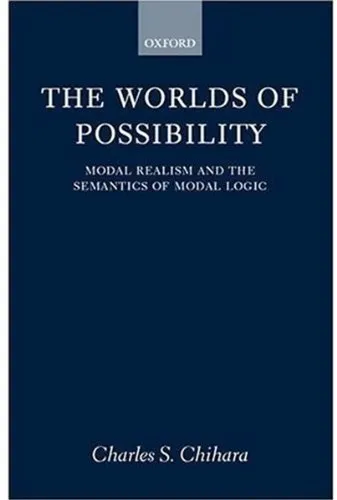The Worlds of Possibility: Modal Realism and the Semantics of Modal Logic
5.0
Reviews from our users

You Can Ask your questions from this book's AI after Login
Each download or ask from book AI costs 2 points. To earn more free points, please visit the Points Guide Page and complete some valuable actions.Introduction to 'The Worlds of Possibility: Modal Realism and the Semantics of Modal Logic'
Welcome to an insightful journey into the realms of possibility and the semantics of modal logic, as presented in my book, 'The Worlds of Possibility: Modal Realism and the Semantics of Modal Logic'. This introduction aims to guide you through the book's core ideas and significance in the fields of philosophy and logic, providing you with a deeper understanding of modal realism and its semantic implications.
Detailed Summary of the Book
The book delves into the intricate landscape of modal logic, a branch of logic that explores necessity and possibility. Within its pages, the concept of 'modal realism' is rigorously analyzed. Modal realism, most prominently advocated by philosopher David Lewis, posits that all possible worlds are just as real as the actual world we live in. By building on Lewis's ideas, the book offers an exploration of how this intriguing thesis can be interpreted and applied to semantic structures.
Through careful examination, the book addresses fundamental questions: What makes a world possible? How can we understand and utilize possible worlds in philosophical discussions? These issues are tackled through a detailed analysis of the application of possible worlds to modal expressions in formal semantics. The interplay between language and metaphysics is critically evaluated, providing readers with a robust theoretical framework to understand the significance of possible worlds.
Key Takeaways
- The importance of possible worlds in understanding modal statements about necessity and possibility.
- An in-depth analysis of modal realism and its implications for both logic and philosophical semantics.
- How philosophical theories about possible worlds intersect with the practical semantics of language.
- An examination of contrasting views and criticisms of modal realism, fostering a broader perspective on this contested philosophy.
Famous Quotes from the Book
"Modal realism invites us to see the universe not as a single thread of actuality but as a tapestry richly woven with diverse possibilities."
"In contemplating possible worlds, we begin to grasp the sheer vastness of reality and the fabric of what might come to be."
Why This Book Matters
The significance of this book is grounded in its ability to bridge complex philosophical concepts with accessible understanding and practical semantics. By examining modal realism, it challenges readers to rethink conventional perceptions of reality and offers a profound commentary on how the potentialities contribute to our understanding of the world and language. This book is essential reading for those interested in philosophical logic, linguistics, and metaphysics, as it not only outlines various theories but also engages with critical discourse surrounding them.
Furthermore, 'The Worlds of Possibility' provides a comprehensive critique of modal realism and an incisive interpretation of its role in contemporary philosophical discourse. It casts light on the practicality of possible worlds theory in enhancing the comprehension of modal language, making it a vital resource for students and scholars who wish to delve into the complex interplay between language and metaphysical thought.
This book matters because it pushes the boundaries of traditional logic and opens up new avenues for research and discussion. It challenges readers to broaden their philosophical perspectives and offers a substantive contribution to ongoing conversations in the fields of logic and the philosophy of language.
Free Direct Download
You Can Download this book after Login
Accessing books through legal platforms and public libraries not only supports the rights of authors and publishers but also contributes to the sustainability of reading culture. Before downloading, please take a moment to consider these options.
Find this book on other platforms:
WorldCat helps you find books in libraries worldwide.
See ratings, reviews, and discussions on Goodreads.
Find and buy rare or used books on AbeBooks.


